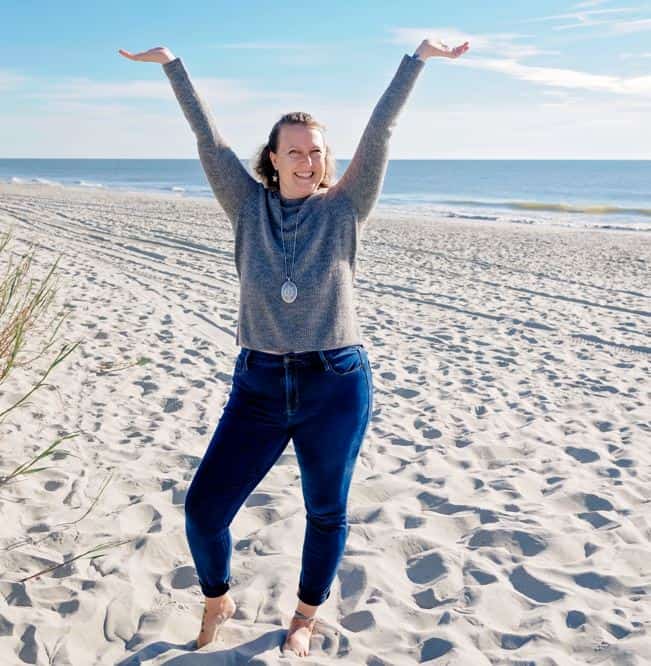
Amy Capello was diagnosed with inflammatory breast cancer in April 2020. This is her story in her own words.
You know how we’re all told not to Google our symptoms when we’re sick, but we all do it anyways? April 2020 and I was doing just that. Everything came back with inflammatory breast cancer (IBC), but it is such a rare type of breast cancer and I was 38 years old and healthy – having just gotten glowing reports from a physical a few months prior – so there was no way that could be IBC.
Until it was.
On April 22, 2020, I was diagnosed with stage 3 IBC. I was one of the lucky ones because it showed up on the mammogram and ultrasound. A lot of my IBC sisters fight a long, hard battle for their diagnosis because it often does not show up on those scans – they know something is wrong, but it’s so rare and doctors are wildly dismissive. One friend is still fighting to get someone to listen to her and, after her mammogram came back clear, her doctor shrugged and told her to come back when she’s 40. Her breast is swollen, extremely painful and feels full of sand. We don’t know yet what it is, but I know I was lucky that mine showed up right away.
I was lucky that I was stage 3. Most women are shocked when I say I was lucky with stage 3, but since IBC is only staged in 3 or 4, I know how lucky I am.
When I was diagnosed, my nurse husband was out of the state, helping at a hospital at the start of the Covid-19 pandemic. I was alone when I found out and had to lie to him all day long because I couldn’t tell him I had cancer while he was working, fighting to save lives.
I told him over a video call that night. We had to support one another through the phone. And even though I had to do all my appointments alone – chemo alone, radiation alone – because of Covid. And even though my husband didn’t meet my oncologist until a year after treatment because he could not come to appointments with me because of the pandemic, somehow, I still didn’t feel alone.
I was so blessed to have a tribe of breast cancer sisters, IBC sisters, flattie sisters, family and friends. You really find your tribe when you go through a diagnosis like this.
I had four months of dose dense chemo (AC & Taxol), followed by a modified radical non-skin sparing double mastectomy and 32 rounds of radiation (18 with the bolus), ending with six months of oral chemo to wrap it all up.
It was less than two years ago and yet it feels like a lifetime ago. I forget about my cancer every day and am reminded of it every day as well. I am busy building my own company, raising my young son and two bonus daughters and being a wife. But then I’ll feel my port pinching when I go to bed and lay on my side. I can’t book a client one day because I have to get my hormone therapy. I see the 2.5 feet of scars on my concave, flat chest and my clothes fit differently. I’ve gained 50 pounds since starting hormone therapy. I wear a lymphedema sleeve and travel with a giant lymphedema pump.
But I am not a survivor, I am a thriver. I am living like I’m dying, even though I’m claiming a life long-lived. I didn’t go through this entire process to watch life go by with me on the sidelines or die with a list of I-wish-I-hads.
Inflammatory breast cancer kicked my YOLO (you only live once) into overdrive, and I’ll be damned if I live a day wasted. Sometimes that means a nap in bed, sometimes it means telling someone no, sometimes it means letting my son snuggle on the couch all day with me.
Every day means I’m thankful for that day.
I know it’s probably not what most people would say, but I wouldn’t take my cancer back for anything. I know my mortality now. I know my worth. I know my beauty. I know who I am and what I’m here to do, and I’ll do it with abandon. Nothing can stop me from showing up and living this life – not IBC, not anything. I’m here for it all.
Statements and opinions expressed are that of the individual and do not express the views or opinions of Susan G. Komen. This information is being provided for educational purposes only and is not to be construed as medical advice. Persons with breast cancer should consult their healthcare provider with specific questions or concerns about their treatment.



